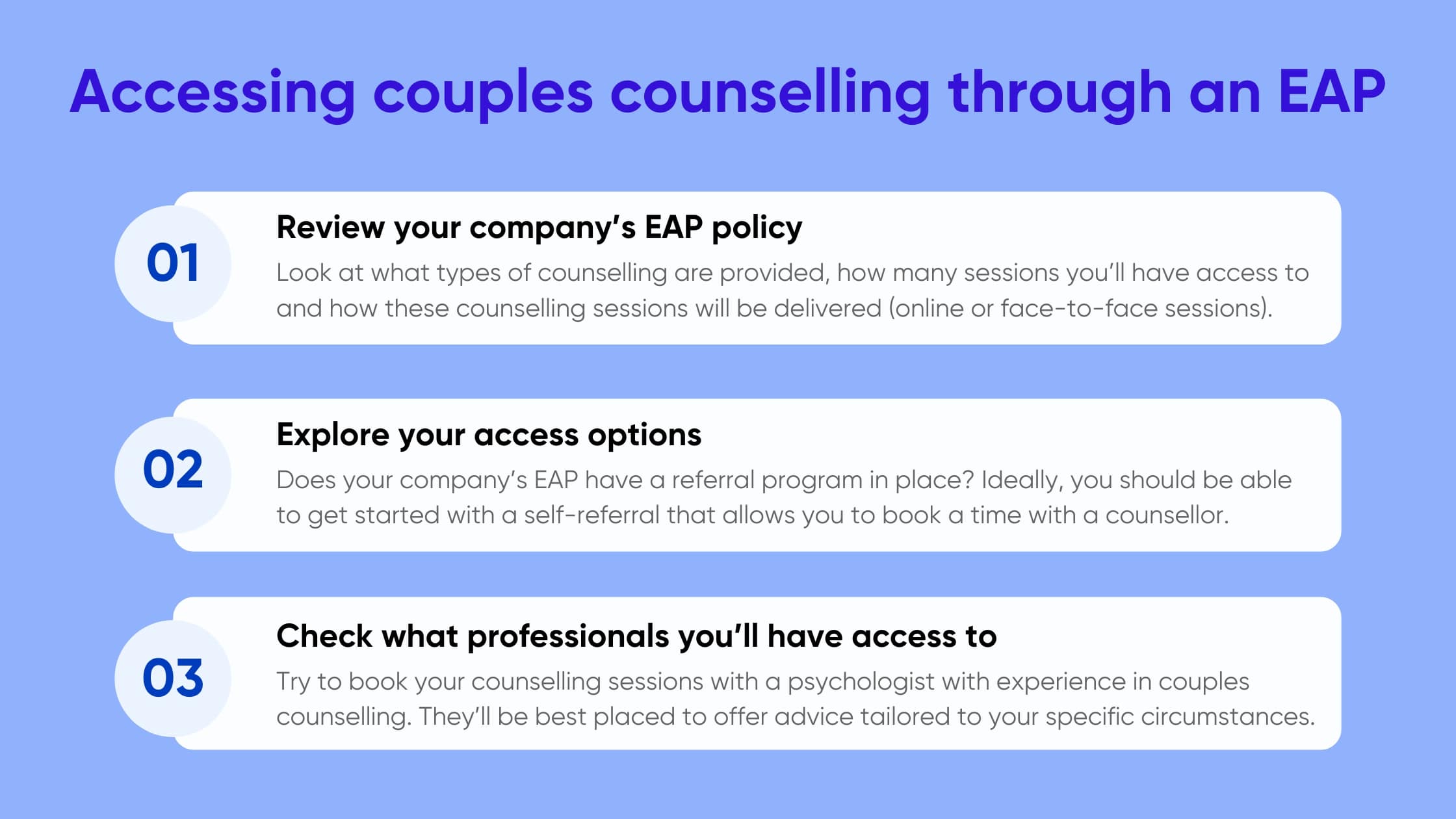The TL;DR:
- Most Employee Assistance Programs (EAPs) include couples counselling, allowing individuals and their partners to seek counselling support free of charge.
- Couples counselling through EAPs is generally focused on short-term solutions with a cap on how many sessions couples can attend per year.
- For more complex relationship challenges, seeking counselling outside of EAPs is a helpful way of tackling the root causes of partnership problems and issues.
Life can be complicated, especially when it comes to relationships. From financial conflict to navigating trust issues or even mismatched parenting styles, couples counselling can be a powerful way to overcome tensions and strengthen relationships.
Recent research from Relationships Australia found over 70% of Australians have faced relationship pressures in the last six months. Interestingly, external factors can place unwanted pressure on couples, with 1 in 5 Australians citing work or study commitments as the biggest pressure on their most important relationships.
But did you know that your company’s Employee Assistance Program (EAP) may cover the costs of couples counselling? In this blog, we’ll be diving into the scope of care for EAPs, unpacking how couples can gain counselling support and what long-term support services are available beyond EAPs.
Do EAPs typically include couples counselling?
When you think of EAPs, you likely think of chatting with a counsellor about work-related stresses, like managing a busy workload or navigating difficult conversations with coworkers.
However, EAP counselling services extend well beyond what happens in the office. In fact, these programs are designed to help you navigate any personal or work-related challenges that might impact your performance at work.
So, do EAPs cover couples counselling? In most cases, the answer is yes.
While EAPs vary across organisations, confidential couples counselling is increasingly recognised as a key component of these programs. Delving into your specific EAP inclusions or chatting with your HR department can reveal what support is available to you and your partner.
Want to figure out if you can access couples counselling through your EAP? Here are a few practical places to start:
- Review your company’s EAP policy: The key here is to look at what services are included and covered by your employer as part of the program. Look at what types of counselling are provided, how many sessions you’ll have access to and how these counselling sessions will be delivered (online or face-to-face sessions).
- Explore your access options: Does your company’s EAP have a referral program in place? Ideally, you should be able to get started with a self-referral that allows you to book a time with a counsellor at a time that works for you.
- Check what professionals you’ll have access to: If possible, try to book your counselling sessions with a psychologist with experience in couples counselling, as they’ll be best placed to offer advice and support tailored to your specific circumstances.

When couples turn to EAPs: Common scenarios
Asking for help can be daunting, especially when it comes to relationship challenges. However, if left unchecked, disagreements and conflict between partners can lead to much more serious consequences, including relationship or marital breakdown.
Among Australian couples, the top three relationship issues leading to divorce include communication problems (27%), loss of connection (21%) and infidelity or trust issues (20%).
Source: Associated relationship and Marriage Counsellors
These are just some of the key challenges that can be tackled with couples counselling. Many couples turn to counselling to gain practical tools for navigating common points of tension in relationships, including:
- Trust and infidelity
- Financial stress and conflict
- Navigating past traumas
- Sex and intimacy
- Life stages and transitions
- Addiction
- Misaligned goals, values or parenting styles
All of these common concerns can directly impact an individual’s ability to deliver their best work in their job, which is why these challenges can be addressed in couples counselling through EAPs.
How couples counselling works
Just like other types of counselling, couples therapy is facilitated by a psychologist or counsellor. The goal of couples counselling is to resolve issues and overcome challenges in a constructive, supportive and positive environment.
Usually, counsellors use open-ended questions to guide the conversation and probe the root causes of tension before developing a road map for how both partners can work together to improve the relationship.
Two-thirds of Australian men and women believe couples counselling has contributed to resolving their relationship problems.
Source: Australian Institute of Family Studies
Whether sessions are held online or in person, couples counselling usually takes place over a number of sessions to ensure you can effectively overcome misunderstandings, improve your communication skills and strengthen your active listening skills.
For example, Relationships Australia typically runs sessions between 55 and 85 minutes in length, available both face-to-face and online. During your initial session, you’ll work with your counsellor to figure out how many sessions you’ll need, too.
Couples counselling vs EAP counselling: what is best suited to your relationship?
Couples counselling through EAPs is generally short-term and solution-focused. Many traditional EAP providers cap the number of sessions offered per year, limiting the scope of what can be covered in these counselling sessions.
In comparison, traditional couples counselling is free from session limits, allowing couples to deeply explore the issues and challenges that might be impacting their partnership.
Couples counselling through EAPs |
Traditional couples counselling |
|
|
|
|
|
|
|
|
Generally speaking, couples counselling through EAPs is a good starting point for tackling relationship challenges. With the costs of these sessions covered by your employer, this can be an affordable, accessible way of beginning to unpack issues in your relationship.
However, if you are looking to overcome complex, multifaceted issues, traditional couples counselling can allow you to seek out specialist expertise and long-term support.
Beyond EAPs: Exploring long-term couples counselling options
While EAPs serve as a valuable resource for immediate support, particularly in addressing short-term relationship issues, they are often just the first step in a more comprehensive counselling journey.
For couples facing more complex, deep-rooted challenges, EAP psychologists and counsellors can help facilitate the transition to longer-term counselling options. This may include being ‘referred out’ to a specialist counselling provider or providing recommendations for other service providers who might be useful.
When weighing up your long-term couples counselling options, it’s worth thinking about:
- Do you and your partner have preferences around a counsellor’s therapy style or personality traits?
- What areas of expertise are most important to you and your partner?
- How do you want to receive counselling long-term (in person vs online)?
???? Sonder Tip: Counselling is a deeply personal experience, so consider meeting with a number of counsellors to find the right fit for your relationship’s needs.
Moving forward with informed choices
Understanding the coverage of couples counselling in your EAP is just the starting point.
It’s about exploring all avenues-be it through your current EAP provider or seeking more specialised services from a couples counsellor. The goal is to make informed choices that align with the needs and wellbeing of both partners, ensuring support that is not just immediate but sustainable for your relationship’s future.
At Sonder, we recognise that each member’s social connections (including their relationship with their partner) impacts their wellbeing. With this in mind, couples counselling is one of the support pathways offered to Sonder members. Following a triage process, support is provided via a registered psychologist at no cost to the member. These sessions are aimed at improving partnership problems and issues and can be done over video call, or face-to-face, depending on the member’s location.
As a prevention-focused platform, Sonder’s app is also packed with wellbeing resources, including plenty of articles offering expert relationship advice. This simplifies access to professional and confidential support and actively prevents crisis moments before they occur.
For more personalised information on how Sonder could support your workforce, book a demo with a member of the Sonder team here.



